- Home
- Lisa Kleypas
Devil's Daughter: The Ravenels Meet the Wallflowers Page 7
Devil's Daughter: The Ravenels Meet the Wallflowers Read online
Page 7
“You also made colorful threats involving the fireplace poker,” Mr. Ravenel reminded her.
“No,” Kathleen retorted, “that was the housekeeper.”
The story continued its descent into farce as Mr. Winterborne volunteered that he’d stayed at Eversby Priory while recovering from eye injuries and hadn’t been told about the pig. “I heard it from my sickbed, and assumed it was another dog.”
“A dog?” Lord Trenear repeated from the head of the table, staring at his friend quizzically. “Did it sound like a dog to you?”
“Aye, with breathing problems.”
The group dissolved in hilarity.
Smiling, Phoebe glanced at Mr. Ravenel and found his gaze on her. A curious and inexplicable spell of intimacy seemed to have settled over them. Swiftly he turned his attention to an unused fruit knife near his plate, picking it up in one hand, scraping his thumb across the blade to test its sharpness.
Phoebe’s breath caught with concern. “No, don’t,” she said softly.
He smiled crookedly and set aside the knife. “A force of habit. Forgive my manners.”
“It wasn’t that. I was afraid you might cut yourself.”
“You needn’t worry. My hands are as tough as whitleather. When I first came to Eversby Priory—” He paused. “No. I said I wouldn’t talk about farming.”
“Oh, do go on. When you first came here . . . ?”
“I had to start visiting the tenants, which scared the wits out of me.”
“I should think they would have been more scared of you.”
A breath of amusement escaped him. “There are many things that scare farmers, but a pot-bellied, half-drunk buffoon from London isn’t one of them.”
Phoebe listened with a faint frown. She’d rarely, if ever, heard a man speak so unsparingly about himself.
“The first day,” Mr. Ravenel continued, “I was somewhat the worse for wear, having decided to stop living like a swill-tub. Sobriety didn’t agree with me. My head ached, I had all the balance of a toy sailboat, and I was in the devil’s own mood. The farmer, George Strickland, was willing to answer my questions about his farm as long as he could do it while working. He had to cut oats and bring them in before it rained. We went out to the field, where some men were scything and others were gathering and binding the cut stalks. A few were singing to keep everyone in rhythm. The oats were as high as my shoulder, and the smell was so good—sweet and clean. It was all so . . .” He shook his head, unable to find the right word, his gaze distant.
“Strickland showed me how to bind the stalks into sheaves,” he continued after a moment, “and I worked along the row while we talked. By the time I reached the end of the row, my entire life had changed. It was the first useful thing I’d ever done with my hands.” He smiled crookedly. “I had a gentleman’s hands, back then. Soft and manicured. They’re not nearly so pretty now.”
“Let me see them,” Phoebe said. The request sounded more intimate that she had intended. Heat crept up her throat and cheeks as he complied slowly, extending them a bit lower than the tabletop, palms down.
The noise all around them, the fastidious clatter of flatware against china, the shimmers of laughter and light conversation, receded until it seemed as if they were the only two people in the room. She looked down at his hands, sturdy and long-fingered, the nails filed until only the thinnest white crescents were visible at the fingertips. They were immaculately clean, but the tanned skin was a bit dry and roughened at the knuckles. There were a few small scars left from nicks and scrapes, and the last vestige of a dark bruise lingering beneath one thumbnail. As Phoebe tried to picture those capable hands being soft and manicured, she found it impossible.
No, they weren’t pretty. But they were beautiful.
She shocked herself by imagining how his hand might feel on her skin, rough-textured and gentle, with wicked knowledge in his fingertips. No, don’t think of it—
“An estate manager doesn’t usually have to work alongside the tenants, does he?” she managed to ask.
“He does if he wants to talk to them. These men and their wives don’t have time to set aside their labors for a leisurely cup of tea at midmorning. But they’re willing to have a conversation while I help repair a broken fence or take part in brick making. It’s easier for them to trust a man with a bit of sweat on his brow and calluses on his hands. Work is a kind of language—we understand each other better afterward.”
Phoebe listened carefully, perceiving that not only did he respect the estate tenants, he sincerely liked them. He was so very different from what she’d expected. No matter what he had once been, the cruel and unhappy boy seemed to have made himself into someone capable of empathy and understanding. Not a brute. Not a bad man at all.
Henry, she thought ruefully, our enemy is turning out to be awfully difficult to hate.
Chapter 8
Usually West awakened feeling refreshed and ready to begin the day. This morning, however, the rooster’s crowing seemed to scrape his nerves raw. He’d slept badly from too much food and wine, and too much stimulation in the form of Phoebe, Lady Clare. His broken sleep had been filled with dreams of her, in his bed, involved in a variety of sexual acts he was willing to bet she’d never consent to. Now he was frustrated, surly, and as randy as a roebuck.
West had always congratulated himself on being too clever to desire a woman he couldn’t have. But Phoebe was as rare as a year with two blue moons. All through dinner, he’d marveled at how beautiful she was, the candlelight striking gleams from her hair and skin like rubies and pearls. She was clever, perceptive, quick as a whip. There had been hints of an absolutely lacerating wit, which he loved, but there were also touches of shyness and melancholy that went straight to his heart. She was a woman who badly needed to enjoy herself, and he wanted to indulge her in some thoroughly adult fun.
But Phoebe, Lady Clare, wasn’t meant for him. He was a former wastrel with no property, no title, and no wealth. She was a highborn widow with two young sons. She needed a proper, well-heeled husband, not a scandalous affair.
That didn’t stop West from imagining it, however. That red hair, loose and flowing across the pillow. Her mouth, kiss-swollen and open under his. Naked skin, all ivory and pink. The warm hollows of her elbows, the smooth, cool curves of her breasts. A little triangle of fiery curls for him to play with . . .
With a faint groan, West rolled to his stomach and buried his face in his pillow. He was suffused with an excited but wretched hot-and-cold feeling. He thought he might be feverish. Maybe it had something to do with his prolonged period of abstinence. Going without physical release was said to be bad for a man’s health. It must be that he was suffering from a dangerous buildup of male essence.
With a muffled curse, he left the bed and went to wash in cold water.
As he dressed in his everyday clothes, West could hear the bustle of busy servants trying not to wake the guests. Doors opened and closed, voices murmured quietly. Unidentifiable clinkings and clankings littered the air. He could hear horses and vehicles outside on the gravel drive, having come with deliveries from the florist, the baker, the confectioner, the wine merchant.
The wedding would take place in approximately five hours, followed by an extravagant breakfast attended not only by the guests from last night, but also the local gentry, townspeople, and Eversby Priory tenants. The crowd would overflow from the house to the gardens, where rented folding tables and camp chairs had been set up. Musicians had been hired for the ceremony and breakfast, and an incredible amount of champagne had been ordered. The event had cost a bloody fortune. Thankfully that was Devon’s concern, not his.
After brushing his teeth and combing back his damp hair, West went downstairs. Later, with the assistance of Devon’s valet, Sutton, he would shave and put on his wedding attire and morning coat. For now, he had to make certain everything was proceeding as planned.
Devon was the only person in the morning room, sitting at one o
f the round tables with a page or two of notes and a cup of coffee. Ironically, even though he didn’t usually arise at this hour, he looked fresh and rested, whereas West felt tired and irritable.
His older brother looked up from his notes and smiled. “Good morning.”
“What are you so bloody pleased about?” West went to the sideboard and helped himself to coffee from a steaming silver urn.
“After today, Cassandra will be the only unmarried sister left.”
Not long ago, without warning, Devon had inherited a wreck of an estate with its finances in shambles, as well as the responsibility for two hundred tenants, an aging staff of fifty servants, and three young, unworldly Ravenel sisters. He could have easily sold everything that wasn’t entailed and razed the manor house to the ground. He could have told everyone who lived at Eversby Priory—including the Ravenel sisters—to fend for themselves.
However, for reasons West would never entirely understand, Devon had taken on the overwhelming burden. With hard work and some luck, he had managed to stop the estate’s downward spiral. Now the manor house was in the process of restoration, their balance sheet was in order, and the farms yields would actually turn a small profit this year. Helen, the oldest sister, had married Rhys Winterborne, who owned a department-store empire, and Pandora was, improbably, about to marry the heir to a dukedom.
“You’ve worried over those girls for two years, haven’t you?” West asked. “A damn sight more than their own father and brother ever did. You’ve done well by them, Devon.”
“As have you.”
West responded with a snort of amusement. “I’m the one who told you to wash your hands of the entire mess and walk away.”
“But you agreed to help anyway. You took on more grueling work than anyone else, including me. I could argue that you’ve done the greater part of saving the estate.”
“Good God. Let’s not make too much of some half-competent land management.”
“The land is the estate. Without it, the family name and the earldom are meaningless. Because of you, we may turn a profit for the first time in a decade. And by some miracle you’ve managed to drag some of the tenants into the era of modern agriculture.”
“Kicking and screaming the entire way,” West added dryly. He sat beside his brother and glanced at the notes. “The broken pew in the chapel has been repaired—you can cross that off the list. The keg of caviar arrived yesterday. It’s in the icehouse. I don’t know whether the extra camp chairs are here yet. I’ll ask Sims.” He paused to drink half his coffee in one swallow. “Where’s Kathleen? Still abed?”
“Are you joking? She’s been awake for hours. At the moment she’s with the housekeeper, showing deliverymen where to set the flower arrangements.” A fond smile crossed Devon’s lips as he rolled the pencil against the tabletop with the flat of his hand. “You know my wife—every detail has to be perfect.”
“It’s like staging a production at St. James’s Music Hall. Without, sadly, the chorus girls in pink tights.” West drained the rest of his coffee. “My God, will this day never end?”
“It’s only six o’clock in the morning,” Devon pointed out.
They both sighed.
“I’ve never thanked you properly for marrying Kathleen at the registrar’s office,” West commented. “I want you to know how much I enjoyed it.”
“You weren’t there.”
“That’s why I enjoyed it.”
Devon’s lips twitched. “I was glad not to have to wait,” he said. “But had there been more time, I wouldn’t have minded going through a more elaborate ceremony for Kathleen’s sake.”
“Please. Shovel that manure in someone else’s direction.”
Devon grinned and pushed back from the table, taking his cup to the sideboard for more coffee. “I thought last night went well,” he remarked over his shoulder. “You and Lady Clare appeared to hit it off.”
“How did you arrive at that conclusion?” West asked, trying his best to sound indifferent.
“For most of the dinner, you stared at her as if she were the dessert course.”
Making his face expressionless, West leaned back in his chair and regarded his empty cup. He could barely wedge one fingertip through the ornate loop. “Why are the handles on these teacups so small? Were they made for babies?”
“It’s French porcelain. Kathleen says we’re supposed to pinch the handle between the thumb and forefinger.”
“What’s wrong with adult-sized cups?”
Unfortunately, the diversionary tactic didn’t budge Devon from his original subject. “I wasn’t the only one to notice the attraction between you and Lady Clare.”
“At the moment,” West said, “I’d be attracted to any available woman under the age of ninety. The spring breeding season hasn’t yet finished, and every creature on this estate has been happily fornicating for weeks. Except me. Do you know how long I’ve been celibate? Every morning I wake up in a state of medical crisis.”
“I should think an attractive young widow would be able to help with that,” Devon said, resuming his seat.
“You must still be half crocked from all the wine last night. There’s no possibility a woman like Lady Clare would take a serious interest in me. Nor would I want her to.”
Devon gave him an astute glance. “You think her too far above you?”
Fiddling with the teacup handle, West accidentally caught a fingertip in it. “I don’t think it. She is too far above me—morally, financially, socially, and any other ‘ly’ you can think of. Besides, as I’ve said many times before, I’m not the marrying kind.”
“If you’re trying to hang on to your carefree bachelor’s existence,” Devon said, “it died approximately two years ago. You might as well accept that and settle down.”
“I would show you the appropriate finger,” West muttered, “if it weren’t stuck in this baby handle.” He tugged at his imprisoned middle digit, trying to free it without snapping the teacup’s porcelain loop.
“If a woman like Lady Clare has even the slightest interest in you, you don’t slink away. You fall to your knees in gratitude.”
“For the first half of our lives,” West retorted, “you and I were at everyone’s mercy. Pushed, pulled, and manipulated by relations who made our lives pure misery. We were puppets on strings. I won’t live like that again.”
He would never forget those years of being desperately poor and powerless. He and Devon had been outsiders at boarding school, where the other boys had all seemed to know each other. They had all been to the right places, and made jokes he hadn’t understood, and he’d envied their ease with themselves and each other. He’d hated feeling different, always out of place. Devon had quickly learned how to adjust to his circumstances. West, on the other hand, had been angry, awkward, and chubby. His only defense had been to turn into a crass, sneering bully.
In time, West’s resentment had eased, and he’d learned to mask his rough edges with humor. After he’d come of age, a small but tidy annuity from a trust left by his parents had enabled him, finally, to live well, dress well. But the sense of not quite belonging was never far from the surface. In a way, it had helped him learn to navigate between the worlds of aristocrats, poor tenant farmers, servants, tradesmen, bankers, cobblers, and herdsmen. As an outsider, he could see their problems and needs more clearly. Belonging nowhere was almost like belonging everywhere. It had its limitations, however, especially when it came to women like Phoebe, Lady Clare.
“Taking a rich wife . . . a duke’s daughter . . . there would be strings. Golden chains. It would all have to be her way. Her decision would always be the last.” West tugged irritably at his trapped finger. “I’ll be damned if I dance to her tune, or her father’s.”
“We all have to dance to someone’s tune. The best you can hope for is to like the music.”
West scowled. “You never sound like more of an idiot than when you try to say something wise and pithy.”
�
��I’m not the one with his finger stuck in a teacup,” Devon pointed out. “Is there any other reason you won’t pursue her, besides the money? Because that one rings hollow.”
It wasn’t just the money. But West was too tired and surly to try to make his brother understand. “Just because you’ve given up all masculine pride,” he muttered, “doesn’t mean I have to do the same.”
“Do you know what kind of men are able to keep their masculine pride?” Devon asked. “Celibate ones. The rest of us don’t mind doing a little begging and appeasing, if it means not having to sleep alone.”
“If you’re finished—” West began, with an irritated gesture of his hand.
At that moment, the teacup came unstuck, flung itself off his finger, and went soaring through an open window. Both brothers stared blankly after the path of its flight. A few seconds later, they heard a crash of porcelain on a graveled pathway.
In the silence, West shot a narrow-eyed glance at his brother, who was trying so hard not to laugh that his facial muscles were twitching.
Finally, Devon managed to regain control of himself. “So glad your right hand is free again,” he said in a conversational tone. “Especially since it seems that for the foreseeable future, you’ll be making frequent use of it.”
The surprise of Pandora and Lord St. Vincent’s wedding day was that there were no surprises. Thanks to the meticulous planning done by Kathleen and the housekeeper, Mrs. Church, and the skill of the household staff, the ceremony and breakfast were impeccable. Even the weather had cooperated; the morning was dry and clear beneath a crystalline blue sky.
Pandora, who walked down the aisle of the estate chapel on Devon’s arm, was radiantly beautiful in a dress of white silk, the billowing skirts so intricately gathered and draped that no lace or ornamental trim had been necessary. She wore a coronet of fresh daisies and a veil of sheer tulle and carried a small bouquet of roses and daisies.
If West had any remaining doubts about St. Vincent’s true feelings for his bride, they were forever banished as he saw the man’s expression. St. Vincent stared at Pandora as if she were a miracle, his cool composure disrupted by a faint flush of emotion. When Pandora reached him and the veil was pushed back, St Vincent broke with etiquette by leaning down to press a tender kiss on her forehead.

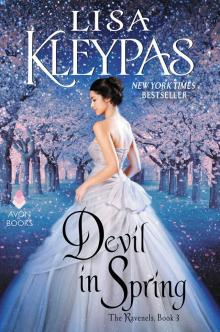 Devil in Spring
Devil in Spring Sugar Daddy
Sugar Daddy Devil in Winter
Devil in Winter Dreaming of You
Dreaming of You Christmas Eve at Friday Harbor
Christmas Eve at Friday Harbor Love, Come to Me
Love, Come to Me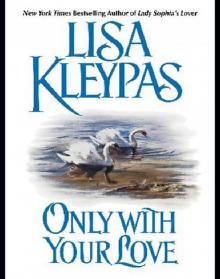 Only With Your Love
Only With Your Love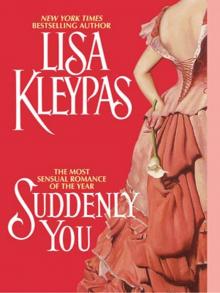 Suddenly You
Suddenly You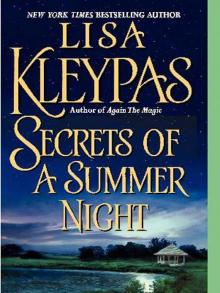 Secrets of a Summer Night
Secrets of a Summer Night Cold-Hearted Rake
Cold-Hearted Rake Where's My Hero?
Where's My Hero? Gifts of Love
Gifts of Love Married by Morning
Married by Morning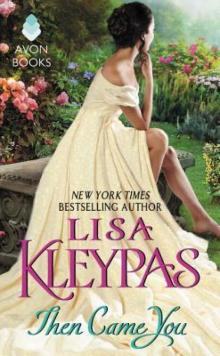 Then Came You
Then Came You Wish List
Wish List Where Dreams Begin
Where Dreams Begin A Historical Christmas Present
A Historical Christmas Present Somewhere I'll Find You
Somewhere I'll Find You Scandal in Spring
Scandal in Spring Someone to Watch Over Me
Someone to Watch Over Me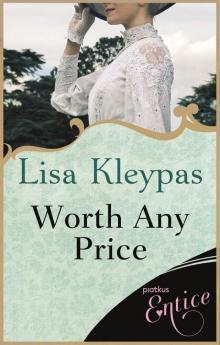 Worth Any Price
Worth Any Price Prince of Dreams
Prince of Dreams It Happened One Autumn
It Happened One Autumn Love in the Afternoon
Love in the Afternoon Devil's Daughter
Devil's Daughter A Wallflower Christmas
A Wallflower Christmas Tempt Me at Twilight
Tempt Me at Twilight Brown-Eyed Girl
Brown-Eyed Girl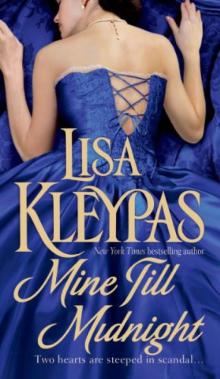 Mine Till Midnight
Mine Till Midnight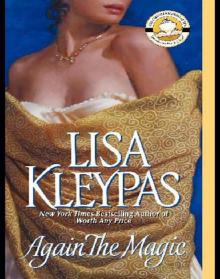 Again the Magic
Again the Magic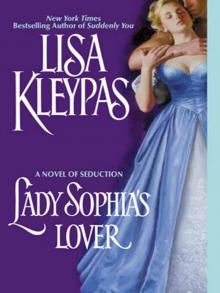 Lady Sophia's Lover
Lady Sophia's Lover Because You're Mine
Because You're Mine Midnight Angel
Midnight Angel Smooth-Talking Stranger
Smooth-Talking Stranger Blue-Eyed Devil
Blue-Eyed Devil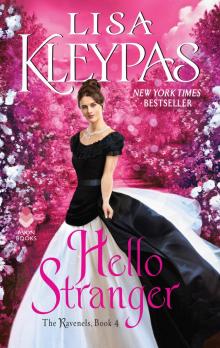 Hello Stranger
Hello Stranger Dream Lake
Dream Lake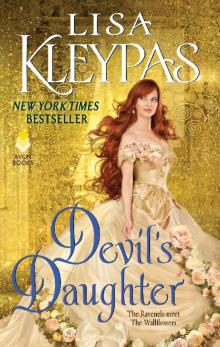 Devil's Daughter: The Ravenels Meet the Wallflowers
Devil's Daughter: The Ravenels Meet the Wallflowers A Christmas to Remember
A Christmas to Remember Smooth Talking Stranger
Smooth Talking Stranger Crystal Cove
Crystal Cove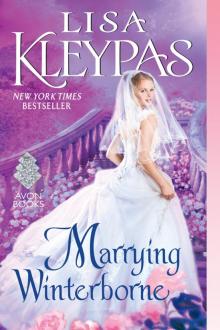 Marrying Winterborne
Marrying Winterborne Stranger in My Arms
Stranger in My Arms Devil in Disguise
Devil in Disguise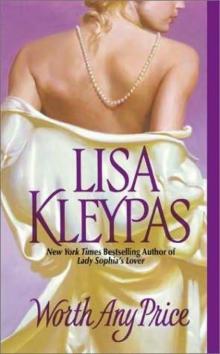 Worth Any Price bsr-3
Worth Any Price bsr-3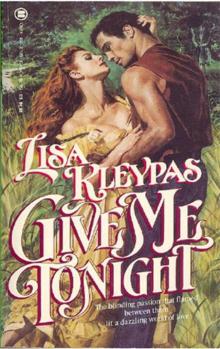 Give Me Tonight
Give Me Tonight Rainshadow Road fh-2
Rainshadow Road fh-2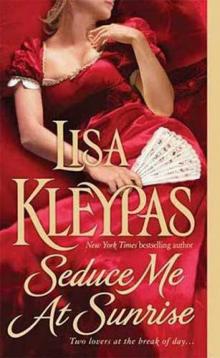 Seduce Me At Sunrise
Seduce Me At Sunrise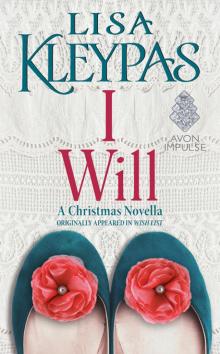 I Will
I Will Someone to Watch Over Me bsr-1
Someone to Watch Over Me bsr-1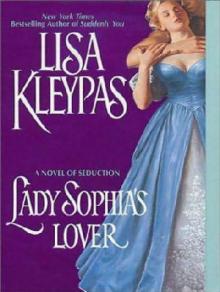 Lady Sophias Lover bsr-2
Lady Sophias Lover bsr-2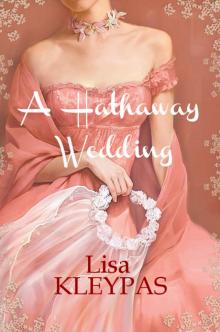 A Hathaway Wedding
A Hathaway Wedding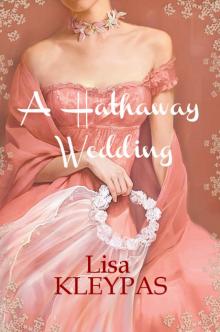 A Hathaway Wedding (Hathaways Bk2.5)
A Hathaway Wedding (Hathaways Bk2.5) Worth Any Price - Bow Street 3
Worth Any Price - Bow Street 3 Christmas with Holly
Christmas with Holly